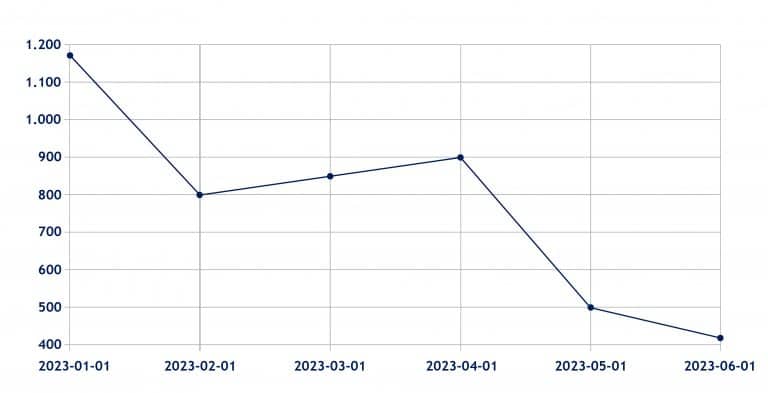AGE OF DOMAIN NAME
AND WHY IT IS IMPORTANT
Identifying scams and suspicious activity on the internet relies on the ability to spot and interpret signals from various pieces of data. In other words, one ought to know where to look and have the ability to recognize fraud when something fishy is going on. As suggested in one of our previous articles, domain length can be one of such signals.
Another important indicator is the age of the domain name. While it may seem inconsequential, the age of a domain plays a crucial role in shaping perceptions of credibility and reliability.
In this article, we evaluate the importance of domain age in establishing trustworthiness in the online realm.
Establish a History of Trust
We suggest that domain age is the first thing online investigators should check when encountering suspicious activity. Domain age is not solely about the number of years a website has existed, but also the reputation it has built over time. An older domain has had the opportunity to accumulate positive user experiences, reviews, and testimonials, further enhancing its trustworthiness.
Moreover, a well-aged domain often boasts a solid online presence with an established social media following, quality content, and a network of reliable partners. These factors collectively contribute to a positive online reputation, reinforcing trust in the minds of visitors.
It is also worth mentioning that search engines are looking at the age of the domain name as one of the factors of trustworthiness, so it has some importance in terms of SEO. Older domains tend to have an advantage over newer ones as search engines often view them as more authoritative and trustworthy due to their longevity. A website with an older domain is more likely to have acquired valuable backlinks and developed a solid reputation, leading to higher rankings in search results.
Caution with New Domain
While the importance of domain age is evident, it is essential to note that new domains can still establish trustworthiness through other means. By implementing robust security measures, providing high-quality content, offering secure payment gateways, and engaging users through responsive customer support, new websites can earn the trust of visitors despite their lack of domain age. However, they may need to invest additional effort in building credibility to overcome the initial skepticism associated with newer domains.
Here are several reasons due to which newly registered domain names can raise suspicion:
1. Lack of Reputation: Since a newly registered domain has no established track record or history, it is difficult to determine its trustworthiness. Without any online presence or reputation, there is little information available to assess its legitimacy.
2. Potential for Fraudulent Activity: Some individuals or entities may register new domains with malicious intent, such as phishing scams, spreading malware, conducting fraudulent activities, or engaging in spamming practices. They might exploit the lack of reputation and use the domain for illegal or unethical purposes.
3. Short-Term Nature: Cybercriminals sometimes register domain names for short-term use to carry out their illicit activities before the domain is flagged or blacklisted. These “throwaway” domains are intentionally short-lived, making them less trustworthy by default.
4. Mimicking Established Brands: Fraudsters often register newly created domains that mimic the names of well-known and trusted brands. By creating websites that resemble legitimate businesses, they can deceive unsuspecting users into sharing personal information or making fraudulent transactions.
5. Search Engine Manipulation: Some individuals or organizations register new domains to engage in search engine manipulation techniques, such as black hat SEO practices. These tactics aim to artificially boost search rankings or manipulate online visibility, potentially leading to spammy or low-quality websites.
6. Lack of Verification: The registration process for domain names does not typically involve extensive verification of the registrant’s identity or intentions. This loophole allows for the potential misuse of newly registered domains by malicious actors.
While the importance of domain age is evident, it is essential to note that new domains can still establish trustworthiness through other means. By implementing robust security measures, providing high-quality content, offering secure payment gateways, and engaging users through responsive customer support, new websites can earn the trust of visitors despite their lack of domain age. However, they may need to invest additional effort in building credibility to overcome the initial skepticism associated with newer domains.
Research suggestion based on the age of domain names
DomainCrawler platform offers digital researchers an opportunity to check newly registered domain names in combination with other filters which might help them to look in the right direction.
For example, according to our findings, there are 17,805,455 domain names registered since January 1, 2023, that are associated with reachable websites. This number is, of course, hardly processable.
However, if we filter out all the websites that have some eCommerce solution and a payment processor but no SSL certificate there are only 4,659 records.

Obviously, there is a need for deeper investigation but there is a high probability of finding websites that were created with malicious intent.
In order to narrow down the search further it is possible to filter out domains that contain a certain keyword, such as a particular brand name, in HTML content or domain name itself to find those websites that might sell counterfeits.
Conclusion
The age of a domain name carries substantial weight in the online landscape when it comes to establishing trustworthiness. An older domain implies stability, authority, and a proven track record, all of which contribute to building trust among users.
While new domains can still build credibility through various means, the advantages conferred by a well-aged domain are undeniable. In the competitive online environment, understanding and leveraging the significance of domain age can help businesses and individuals solidify their online reputations, enhance visibility, and foster lasting trust among their target audiences.
To find out the creation date of the domain name one needs simply to check its WHOIS record. There are many services on the Internet that allow users to check those records and to see registration details.
Using DomainCrawler platform it is possible to check the creation, update and expiration dates, as well DNS, HTML, SSL information that might help the digital researcher to connect the dots in detection fraudulent websites.
For more info on our platform visit domaincrawler.com


